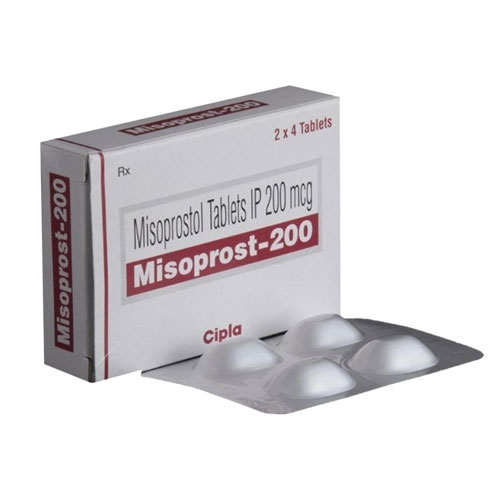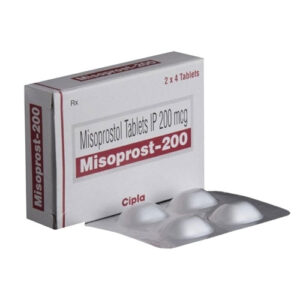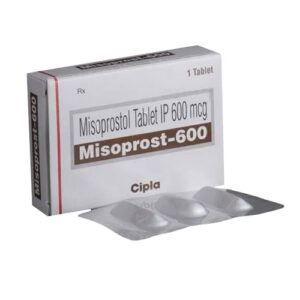ADDICTION
ALCOHOL DEPENDENCE
QUIT SMOKING
ALLERGY
ANTI FUNGAL
FUNGAL INFECTION
FUNGAL NAIL INFECTIONS
ANTI-REJECTION DRUGS
ANTI WORM
ANTIBIOTIC
BACTERIAL INFECTIONS
ARTHRITIS
GOUT
OSTEOARTHRITIS
RHEUMATOID ARTHRITIS
BLOOD
LOW PLATELET COUNT
THROMBOPHLEBITIS
VARICOSE VEINS
COLON
ANAL FISSURE
PILES
ULCERATIVE COLITIS
DIABETES CARE
DIABETES INSIPIDUS
DIABETES TYPE
DIABETIC FOOT ULCERS
GLUCOSE MONITOR
EYES/EAR CARE
DRY EYES
EYE CARE
EYE EXAMINATION
EYE INFECTION
EYE LASHES
EYE PAIN
GLAUCOMA
OCULAR HYPERTENSION
UVEITIS
FEVER CARE
MALARIA
RHEUMATIC FEVER
TYPHOID FEVER
GASTROINTESTINAL
ACIDITY
CONSTIPATION
CROHN'S DISEASE
DIARRHOEA
GALLBLADDER STONES
INTESTINAL ULCERS
IRRITABLE BOWEL SYNDROME
MOTION SICKNESS
NAUSEA
Misoprost (Misoprostol)
Misoprost 200 Mcg (Misoprostol)
Misoprost 600 Mcg (Misoprostol)
| Active Ingredient (Generic Name): | Misoprostol |
|---|---|
| Indication: | Medical abortion, Post-delivery bleeding |
| Manufacturer | Cipla Limited |
| Packaging: | 4 tablets in one strip and 1 tablets in one strip |
From: $31.00
Misoprost (Misoprostol) is prescribed to protect your stomach lining, prevent ulcers, and reduce stomach acid when taking NSAIDs. Take it four times daily with meals and at bedtime, swallowing the tablets whole with water. Avoid cutting or chewing them. Seek guidance for concerns. Apart from ulcers and labor induction, it also helps in treating ulcers due to NSAIDs. Check for interactions and side effects, monitor for symptoms, and adhere to your dosage routine. Ensure proper storage, disposal, and avoid overdose risks. Consult before usage, share no meds, and follow instructions strictly. For more valuable insights on Misoprost, explore further.
To understand the benefits and risks associated with Misoprostol, start by familiarizing yourself with its mechanism of action. Misoprostol works by binding to specific receptors in the stomach lining, leading to increased production of mucus and bicarbonate. This helps protect the stomach from damage caused by acid or certain medications. Additionally, Misoprostol can reduce the secretion of gastric acid, further aiding in the prevention of ulcers.
When taking Misoprostol, it is important to follow your healthcare provider’s instructions carefully. This medication is commonly used to prevent stomach ulcers in individuals taking nonsteroidal anti-inflammatory drugs (NSAIDs) long-term. Misoprostol can also be used in combination with mifepristone for medical abortion. However, it is essential to be aware of the potential side effects, such as diarrhea, abdominal pain, and cramping.
Why is this medication prescribed?
Misoprostol is prescribed to protect the stomach lining and prevent ulcers by increasing mucus production and reducing gastric acid secretion. This medication is commonly used in combination with nonsteroidal anti-inflammatory drugs (NSAIDs) to lower the risk of developing ulcers in individuals who require long-term NSAID therapy. Misoprostol works by enhancing the protective mucus lining of the stomach and decreasing the production of stomach acid, which helps shield the stomach from damage caused by NSAIDs. It is also prescribed for the treatment of ulcers in certain cases. Misoprostol is particularly beneficial for patients who are at a higher risk of developing ulcers due to NSAID use, such as those with a history of ulcers or those taking high doses of NSAIDs. Your healthcare provider may recommend misoprostol to safeguard your stomach and prevent the occurrence of ulcers while undergoing NSAID treatment.
How should this medicine be used?
When using this medication, follow the dosage instructions provided by your healthcare provider to guarantee effective protection of your stomach lining and prevention of ulcers. Misoprostol is usually taken four times a day, with meals and at bedtime. To reduce the risk of gastrointestinal issues, it is important to take this medication consistently and as directed. It is recommended to swallow the tablets whole with a full glass of water. Avoid cutting, crushing, or chewing the tablets. If you miss a dose, take it as soon as you remember, unless it is almost time for the next dose. In that case, skip the missed dose and continue with your regular dosing schedule. Do not double up on doses to make up for a missed one. If you have any questions or concerns about how to use misoprostol properly, consult your healthcare provider for further guidance and clarification.
Other uses for this medicine
You may also use this medicine for treating certain types of stomach ulcers or for inducing labor in pregnant women. Misoprostol can be effective in healing ulcers caused by nonsteroidal anti-inflammatory drugs (NSAIDs) or reducing the risk of ulcers in individuals taking NSAIDs long-term. When used for ulcers, Misoprostol works by protecting the stomach lining and decreasing acid secretion, promoting ulcer healing.
In pregnant women, Misoprostol is sometimes used to induce labor or to help with the completion of a miscarriage. This medication can cause the uterus to contract, leading to cervical changes and the initiation of labor. It is important to use this medicine under medical supervision in pregnant women, as the dosage and timing are critical to guarantee both the safety of the mother and the well-being of the fetus.
Before considering the use of Misoprostol for stomach ulcers or labor induction, consult your healthcare provider to discuss the potential benefits and risks associated with these alternative uses.
What special precautions should I follow?
Before taking misoprostol, make sure to check for any potential drug interactions with any medications you are currently taking. It is important to inform your healthcare provider about all the medications, vitamins, and supplements you are using to avoid any complications. Taking this precaution can help guarantee the safe and effective use of misoprostol for your specific medical needs.
Check for Drug Interactions
To guarantee your safety when taking Misoprost (Misoprostol), always check for potential drug interactions.
- Consult your healthcare provider: Before starting Misoprost, inform your doctor about all medications, supplements, and vitamins you are currently taking.
- Research potential interactions: Use reliable sources like drug interaction checkers or ask your pharmacist to identify possible conflicts between Misoprost and other drugs.
- Monitor for side effects: Be vigilant for any unusual symptoms or changes in your health after starting Misoprost, and report them promptly to your healthcare provider for further evaluation.
What special dietary instructions should I follow?
Following a specific diet is not typically necessary when taking Misoprostol, but it is important to eat a balanced and healthy diet while using this medication. A well-rounded diet consisting of fruits, vegetables, whole grains, lean proteins, and adequate hydration can help support your overall health and well-being during treatment with Misoprostol. It is advisable to avoid excessive consumption of alcohol and caffeine as they may exacerbate certain side effects of the medication. Additionally, spicy foods or foods that may irritate the stomach, such as citrus fruits or high-fat foods, should be consumed in moderation to minimize potential gastrointestinal discomfort.
Maintaining regular meal times and avoiding long periods without eating can also help prevent stomach upset while taking Misoprostol. If you have any specific dietary concerns or restrictions, it is recommended to consult with your healthcare provider or a registered dietitian for personalized guidance on how to best manage your diet while undergoing treatment with Misoprostol. Remember, a balanced diet is key to supporting your overall health and optimizing the effectiveness of your medication.
What should I do if I forget a dose?
If you overlook a dose of Misoprostol, take it as soon as you recollect. However, if it is nearly time for your next scheduled dose, skip the missed dose and continue with your regular dosing schedule. Do not take a double dose to compensate for the missed one.
It is crucial to maintain a consistent dosing schedule when taking Misoprostol to guarantee its effectiveness. Missing a dose occasionally may not have a significant impact, but it is ideal to try and take the medication as prescribed to achieve the desired outcomes.
If you frequently forget doses or have trouble remembering to take your medication, consider setting reminders on your phone, using a pill organizer, or incorporating it into your daily routine to help you remember. If you continue to have difficulty remembering to take your medication, consult your healthcare provider for further guidance on how to enhance adherence to your treatment regimen.
What side effects can this medication cause?
Misoprostol can cause various side effects that you should monitor. Some of these side effects can be serious, so it’s important to be aware of any changes in your body. If you experience symptoms like severe abdominal pain, heavy vaginal bleeding, or signs of an allergic reaction, contact your doctor immediately.
Monitor for Persistent Adverse Effects
Potential side effects of Misoprostol may include abdominal pain, diarrhea, and nausea.
- Abdominal pain: This is a common side effect of Misoprostol and may manifest as cramping or discomfort in the stomach area.
- Diarrhea: Some individuals may experience increased bowel movements or loose stools while taking this medication.
- Nausea: Feelings of queasiness or an upset stomach can occur as a side effect of Misoprostol.
It is important to monitor for these persistent adverse effects and consult your healthcare provider if you experience any of these symptoms. Proper management and communication with your doctor can help address any concerns related to the side effects of Misoprostol.
Some side effects can be serious. If you experience any of the following symptoms, call your doctor immediately:
When taking Misoprostol, it’s important to be aware of potential serious side effects that may require immediate medical attention. If you experience any of the following symptoms, call your doctor immediately:
- Severe abdominal pain or cramping that does not subside.
- Heavy vaginal bleeding or blood clots.
- Symptoms of an allergic reaction such as rash, itching, swelling, severe dizziness, or difficulty breathing.
These signs could indicate a serious complication that needs prompt medical evaluation. It’s essential to seek help if you encounter any of these symptoms while using Misoprostol to guarantee your safety and well-being.
What should I know about the storage and disposal of this medication?
Store this medication in a cool, dry place away from moisture and heat. Keep it out of reach of children and pets to guarantee accidental ingestion. Avoid storing Misoprostol in the bathroom or kitchen, as these areas tend to have higher humidity levels which can degrade the medication. Always check the expiration date before use, and do not use the medication if it has expired. If you no longer need Misoprostol or if it has expired, it is important to dispose of it properly. Do not flush it down the toilet or pour it down the drain unless instructed to do so. Instead, consult with your pharmacist or local waste disposal company on how to safely dispose of the medication. Some pharmacies may have specific medication disposal programs that you can utilize. By storing and disposing of Misoprostol correctly, you can help ensure its effectiveness and prevent harm to others.
In case of an emergency/overdose
During an emergency or in the event of an overdose, seek immediate medical assistance. If you suspect an overdose of misoprostol, it is essential to act promptly. Symptoms of an overdose may include severe stomach pain, diarrhea, tremors, difficulty breathing, seizures, or fainting. Contact emergency services or a poison control center right away. Do not attempt to treat the overdose on your own without professional medical guidance.
When seeking medical help, provide as much information as possible about the situation. Inform the healthcare provider of the amount of misoprostol taken, the time of ingestion, and any symptoms experienced. Be prepared to share details about your medical history and any other medications you may be taking. This information will assist the healthcare team in providing appropriate care and treatment for the overdose.
Remember that timely intervention is critical in cases of overdose. Do not delay seeking medical attention if you suspect an overdose of misoprostol. Your health and well-being are of utmost importance, and healthcare professionals are equipped to help you in such situations.
What other information should I know?
For additional important information, always consult your healthcare provider regarding the use of misoprostol. It is vital to understand that misoprostol should not be shared with others, as it is prescribed specifically for your condition and may not be suitable for everyone. It is essential to follow the dosage instructions given by your healthcare provider and not exceed the recommended amount, as this can lead to serious complications.
Inform your healthcare provider about any existing medical conditions, allergies, or medications you are currently taking before starting misoprostol. This information will help guarantee that misoprostol is safe for you to use and will not interact negatively with any other medications.
Moreover, be aware of the potential side effects of misoprostol, such as stomach cramps, diarrhea, nausea, or headache. If you experience any severe or persistent side effects, contact your healthcare provider immediately. Finally, store misoprostol at room temperature away from moisture and heat, and keep it out of reach of children and pets.
Brand names
When searching for misoprostol at pharmacies, you may come across different brand names for this medication. It’s important to be mindful of these brand names to make sure you are getting the correct medication. Below is a table listing some common brand names for misoprostol:
| Brand Name | Active Ingredient |
|---|---|
| Cytotec | Misoprostol |
| Arthrotec | Misoprostol + Diclofenac |
| Oxaprost | Misoprostol |
| Cytopan | Misoprostol |
| Prostokos | Misoprostol |
It’s essential to verify the active ingredient in these medications to guarantee you are purchasing the right one. Always consult with a healthcare provider or pharmacist if you have any doubts or concerns about the brand name of the medication you are purchasing. Make sure to follow the prescribed dosage and usage instructions regardless of the brand name.
Purchase From Licensed Pharmacies
Consider purchasing misoprostol only from accredited pharmacies to guarantee the authenticity and quality of the medication. Accredited pharmacies adhere to strict regulations and standards set by health authorities, ensuring that the medications they provide are safe and effective for use. By obtaining misoprostol from accredited pharmacies, you reduce the risk of receiving counterfeit or substandard products that may be harmful to your health.
When you buy misoprostol from accredited pharmacies, you can have confidence in the legitimacy of the medication. Accredited pharmacies source their products from reputable manufacturers and distributors, decreasing the likelihood of receiving expired or tampered drugs. Additionally, accredited pharmacists can provide you with essential information on the proper usage, dosage, and potential side effects of misoprostol, enhancing your overall safety and well-being.
To further guarantee the quality of the medication, always check for the pharmacy’s license and accreditation before making a purchase. Avoid acquiring misoprostol from unverified sources or online platforms without proper credentials, as this can pose significant risks to your health. Prioritize your safety by choosing accredited pharmacies for your misoprostol needs.
To summarise
Prioritize sourcing misoprostol from accredited pharmacies to protect your health and well-being. Misoprostol is a medication commonly used for medical abortions, treating stomach ulcers, and inducing labor. When purchasing misoprostol, always make sure that you obtain it from a licensed pharmacy to guarantee the authenticity and quality of the product. Counterfeit or substandard misoprostol can pose serious risks to your health, potentially leading to ineffective treatment or harmful side effects. By obtaining misoprostol from reputable sources, you reduce the likelihood of encountering these dangers and secure the medication’s effectiveness.
Additionally, it is essential to follow the prescribed dosage and administration instructions provided by your healthcare provider or the medication packaging. Misusing misoprostol can result in adverse effects and complications. If you experience any concerning symptoms or side effects while using misoprostol, seek medical attention immediately. Your health and well-being are top priorities, so always approach the use of misoprostol with caution and responsibility.






